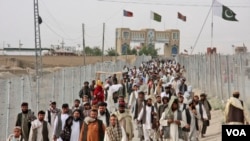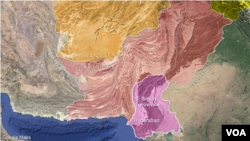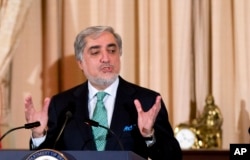Pakistan and Afghanistan have issued conciliatory statements in an apparent attempt to defuse days of border tensions stemming from charges Afghan soil was used for masterminding last week’s terrorist attacks in Pakistani cities.
Pakistani troops have been staging cross-border shelling to target what authorities claimed were camps of Jammat-ul Ahrar, or JuA, a splinter faction of the anti-state Pakistani Taliban for being behind most of the deadly violence.
Islamabad maintains that JuA leaders are sheltering in Afghan border areas from where they plot and direct violence against Pakistan. Security officials also confirmed Monday, the military deployed additional heavy artillery at main border crossings to deter illegal movements.
However, Pakistani military chief, General Qamar Javed Bajwa, Monday explained his troop build up along the Afghan border and enhanced security arrangements are aimed at fighting “common enemy” of terrorism.
“Pakistan and Afghanistan have fought against terrorism and shall continue this effort together,” the general told a security meeting of his top commanders in Rawalpindi, where the military is headquartered.
Bajwa also called “for more effective border coordination and cooperation” with Afghan security forces to prevent cross-border movement of terrorists and other illegal activities, according to a statement released by the military’s media wing after the meeting.
The deadliest terrorist attack in Pakistan targeted a famous Sufi shrine in the southern Sindh province last Thursday. The suicide blast left at least 90 devotees dead and over 300 wounded. Local affiliates of Islamic State took credit for that bloodshed.
Earlier on Monday, Afghan Chief Executive Abdullah Abdullah chaired a meeting of cabinet ministers in Kabul and expressed concerns over Pakistani shelling of border areas, warning such threats would help neither side.
“Afghan forces have been directed from the outset not to take actions that could fuel the tension on the Durand Line,” Abdullah said referring to the frontier with Pakistan.
The Afghan chief executive reiterated terrorist groups, including IS and al-Qaida, active in his country and inflicting bloodshed on Afghans were created outside Afghanistan.
Abdullah did not name any country but Kabul has long alleged that the Taliban and its allies waging years of insurgency against the Afghan government are using Pakistani sanctuaries for regrouping and plotting attacks on the Afghan side.
“These groups are operating under the Taliban umbrella in areas of Afghanistan which are under the influence of the Taliban,” Abdullah asserted.
Separately, the Afghan foreign ministry revealed it has handed over to Pakistan a list of 32 training centers and 85 militant leaders, including that of the Taliban and the terrorist Haqqani network, who are involved in terrorist attacks against Afghanistan.
Kabul has asked Islamabad to take action against these facilities and men to prevent them from staging the cross-border violence.
Monday’s move came after Pakistan last week handed over a list of 76 fugitive militants to the Afghan government, saying they are operating from the Afghan side and masterminded recent violence on Pakistani soil, and demanded Kabul take immediate action against them.
Afghan ambassador to Islamabad, Hazrat Omar Zakhilwal delivered the list to Pakistani civilian and military authorities shortly after he arrived back from Kabul. Speaking to VOA, the Afghan diplomat described his meetings as constructive and positive.
“As a result I expect deescalation of the current tension and the creation of a more positive environment for responding to each other's concerns and grievances in a cooperative manner,” said Zakhilwal
Mutual allegations of sponsoring terrorist attacks on each others’ territory have been at the center of political and diplomatic tensions between Pakistan and Afghanistan, sharing a long porous border of 2,600 kilometers. Both sides deny allegations they are supporting the militants.











